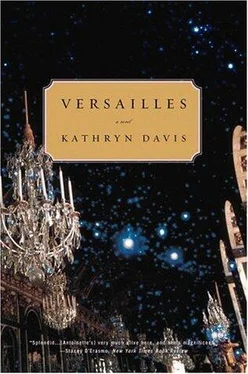Kathryn Davis - Versailles
Здесь есть возможность читать онлайн «Kathryn Davis - Versailles» весь текст электронной книги совершенно бесплатно (целиком полную версию без сокращений). В некоторых случаях можно слушать аудио, скачать через торрент в формате fb2 и присутствует краткое содержание. Год выпуска: 2003, Издательство: Back Bay Books, Жанр: Историческая проза, на английском языке. Описание произведения, (предисловие) а так же отзывы посетителей доступны на портале библиотеки ЛибКат.
- Название:Versailles
- Автор:
- Издательство:Back Bay Books
- Жанр:
- Год:2003
- ISBN:нет данных
- Рейтинг книги:4 / 5. Голосов: 1
-
Избранное:Добавить в избранное
- Отзывы:
-
Ваша оценка:
- 80
- 1
- 2
- 3
- 4
- 5
Versailles: краткое содержание, описание и аннотация
Предлагаем к чтению аннотацию, описание, краткое содержание или предисловие (зависит от того, что написал сам автор книги «Versailles»). Если вы не нашли необходимую информацию о книге — напишите в комментариях, мы постараемся отыскать её.
Versailles — читать онлайн бесплатно полную книгу (весь текст) целиком
Ниже представлен текст книги, разбитый по страницам. Система сохранения места последней прочитанной страницы, позволяет с удобством читать онлайн бесплатно книгу «Versailles», без необходимости каждый раз заново искать на чём Вы остановились. Поставьте закладку, и сможете в любой момент перейти на страницу, на которой закончили чтение.
Интервал:
Закладка:
Sometimes I barely recognized myself and had to pause to realize that this person was really me.
"Tranquillity hangs by a thread," I wrote Axel, trying to get his attention. I sent him a gold ring inscribed Lâche qui les abandonne, after wearing it myself for two days to take the chill off. Coward, to abandon me!
Ach du lieber Augustin, all is lost, all is lost…
And then, one day I looked up. Late winter, lambs being born, also kids and fuzzy yellow ducklings, but it made no difference, I scarcely went anywhere.
I was looking up more those days, holding my head up high, as they say — it gave me a certain perspective, ceilings, birds, clouds, rooftops. Chandeliers. Hot-air balloons. The indifferent sun and indifferent moon as opposed to the expressions on the faces of the people around me, my dejected family, my pitying servants, the occasional furious Jacobin holding a calf s head aloft on a pike at the window, sticking out its tongue at me while its eye sockets buzzed with flies.
Holding my head up high and more than usually aware of my throat, where I used to paint a thin blue vein on top of the thick white makeup we all had to wear in the good old days at Versailles. Full of arsenic, that makeup — though when has it ever been safe to be beautiful? When has it ever been safe to be Queen?
The Blade of Eternity was busy flashing away out there in the weak Parisian sunshine. Monsieur Guillotin's brand-new idea, designed to sever the heads from the bodies of rich and poor alike in less time than it took to blink, or so Madame Campan informed me, having made a point of watching the trial demonstration on a petty criminal, a man convicted of forgery, in the Place de Grève, Nor did the forger's headless body commence to dance, as scientists predicted it might, nor did his bodiless head jabber in the basket.
Though who knows what ghostly thoughts kept flying through the hallways of the forger's brain?
A particularly challenging signature? The extreme forward slant of the capital A ? The ornate flourish trailing from the final letter?
Or maybe his mistress's mouth preparing to smile, her upper lip lifting to reveal the white tips of her teeth and on her breath the smell of the season's first apricots?
Maybe So this is what becomes of Eros.
Maybe OH NO OH NO OH NO OH NO.
One evening in February, I looked up and saw a tall man with a large dog walking into my room.
He was wearing a disguise but I recognized him immediately, just as he did me. Even without mirrors I knew I was no longer slim and pretty, or not so slim though still pretty and vivacious, or verging on fat though radiant; even without mirrors I knew I was pale and haggard and white-haired.
But you can't have let your defenses so thoroughly down with someone and not forever after know them, no matter if they're disguised as a common messenger, like Axel that February day, flying on his winged feet past twelve hundred murderous guardsmen. I saw the melting snowflakes in his black eyelashes. I saw the set of the mouth, a dimple to either side of the faintly trembling lips, the brow no longer smooth yet still wide and intelligent, the nostrils flaring a little with each breath.
The dog was as long-legged as its master, a snow-white creature with pricked ears and a beautiful plumed tail that made me think of the ostrich feathers on my bedposts at Versailles. As I stood there rigid with longing, it leapt up and licked my cheek.
"Odin," Axel said. "Mindyour manners."
And then he embraced me and, really, I thought a person could lose her head forever and what difference would it make.
Only later — much much later, the next day in fact — when Louis finally joined us, did the talk turn to politics. We were flirting with danger. Axel said. Flirting, he repeated and threw me a look; we were playing both ends against the middle, wooing every crowned head in Europe on the one hand, every bloodthirsty revolutionary on the other. It was too late, Axel said; our only hope was escape. Just because the last attempt had failed was no reason not to try again. "We could head northeast this time, concealed within the dark tunnel of forests that stretched from Paris to the marches of Flanders. Why not? he pleaded, but of course we all knew perfectly well that even if escape had once been possible it no longer was. Not only was every avenue fiercely watched, but Louis had pledged his word to the National Assembly that he would stay in Paris, and Louis was an honorable man.
"If you stay you will die," Axel said.
"When the counterrevolutionaries finally get here," Louis replied, "the revolutionaries will need to keep me alive as a hostage to save themselves."
The human heart is many-chambered; I loved them both. I loved the touch of both men, the one seeking to calm my blood, the other to heat it up. The one froglike in his unfashionable wig, the red sash of the Order of Saint-Louis straining across the immense hill of his belly. The other tall and thin. On edge, watchful. Like a racehorse. A beacon.
Resté là, Axel would later write in his diary. This was his usual method for recording an amorous liaison, the equivalent of Louis's got one, but without the bloodshed.
Marble Court
Quick, quick, along the Avenue de Sceaux. Quickly. Quicker. Sky the palest blue, every trace of color wrung from it by the heat, and off to the left on the far side of the stables and the tennis court, the Sun King's Kitchen Garden, its trees still standing in orderly rows, their boughs heavy with fruit. Pears, apples, apricots, plums. A drift of leaves underfoot, though it's too early, really, the second week in August, the wind from the east and hot.
An unendurably hot wind, breath of the Devil, ovens of hell. Eleven miles to the east, Paris is on fire. The Tuileries have been set ablaze, the royal family herded off to be locked in a tiny cage behind the rostrum of the Legislative Assembly, where everyone can keep an eye on them. "What a lot of leaves!" the King was heard to observe as he and the Queen were making their way along the crowd-filled Terrace of the Feuillants, her face red and blotchy, her bodice stained with sweat.
The wind raises dust from the cobbles of the Parade Grounds, dust and heat phantoms, transparent carriages, shimmering men and women, laughing, rippling, breaking apart.
Let us go, children of France, our day of glory has arrived…
Glory, yes! Let us go!
Four hundred steps from the first of two ornate golden grilles to the second, their gates padlocked, their gilt paint chipping off. Sun directly overhead and out of the wind now. Trash and leaves, dust and grit. Seventy-six steps across the Royal Court and then tap tap tap tap tap up five long stairs and you're almost there.
Almost.
Sun beating down. Down the row of wheat I've run and now my story's almost done…
Eleven miles to the east, the young Napoleon Bonaparte watches the goings-on at the Tuileries from the second-story window of a nearby furniture shop. The Knights of the Dagger, all of them old and infirm, together with a mixed bag of cooks and grooms and laun-drywomen and spies and members of the Swiss Guard, are being thrown from the flame-filled palace windows, sometimes their entire bodies, sometimes just their heads.
Day of glory! Let us go! Little children catch the heads and impale them on sticks. The greenery runs red with blood.
Even after Russia, Napoleon will say he never saw such carnage.
And what of the fat pig that has cost so much to fatten? Let him drink! Let him get drunk! Since Nature has given him a porker's character, let him live on as a porker!
And his tigress wife, meowing sweetly, biding her time till she can scratch again?
Читать дальшеИнтервал:
Закладка:
Похожие книги на «Versailles»
Представляем Вашему вниманию похожие книги на «Versailles» списком для выбора. Мы отобрали схожую по названию и смыслу литературу в надежде предоставить читателям больше вариантов отыскать новые, интересные, ещё непрочитанные произведения.
Обсуждение, отзывы о книге «Versailles» и просто собственные мнения читателей. Оставьте ваши комментарии, напишите, что Вы думаете о произведении, его смысле или главных героях. Укажите что конкретно понравилось, а что нет, и почему Вы так считаете.












